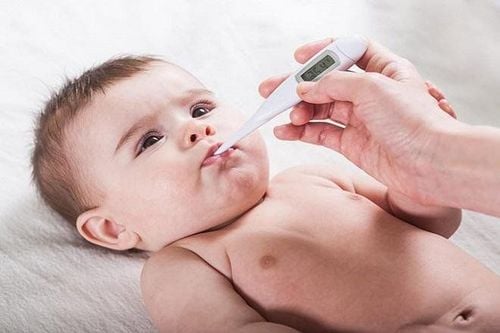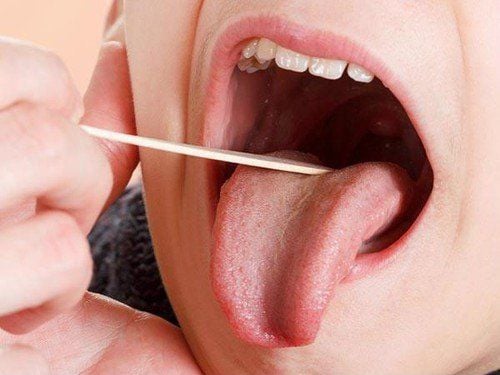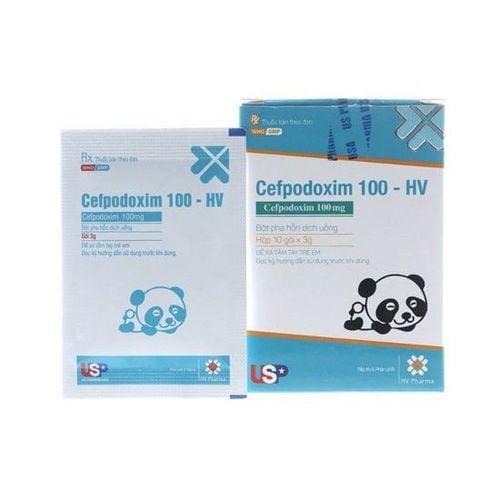This is an automatically translated article.
Winter is also the time when nasopharyngitis in infants begins to thrive again. Newborns infected with nasopharyngitis do not pose too much danger but should be closely monitored by parents because the disease is not dangerous but can have complications that affect the health of the child.
1. What is the cause of nasopharyngitis in infants?
Flu: One of the most common causes of nasopharyngitis in infants is the flu. When your baby has the flu, they will often have symptoms of nasopharyngitis accompanied by symptoms such as a runny nose, dry cough, and loss of appetite. Your baby may even have vomiting and diarrhea. Viral infections: Babies can also get nasopharyngitis if they have a virus. These viruses are spread through a baby's hands, feet, or mouth. If your baby has viral nasopharyngitis, the following symptoms will appear: Red spots will appear around the mouth. A rash on your baby's hands and feet may also occur on the buttocks and other parts. Baby refuses to eat, and doesn't eat well. Herpangina (name of an infectious disease): Another common cause of sore throat is an infectious disease Herpangina. In the case of a sore throat caused by Herpangina, the child will have the common symptoms: Gray and white dots gradually appear in and around the child's mouth more and more. The child has a high fever and diarrhea. Eat not good. Dust allergy. Newborns are very sensitive and require special care. Children must avoid contact with allergens such as dust, powders, spices, ... Allergies are also a small cause that can cause nasopharyngitis in babies.
2. Signs of nasopharyngitis in babies
To help parents recognize nasopharyngitis in babies, Vinmec Hospital doctors will give common signs and symptoms of sore throat:
Baby cries a lot, fusses a lot, especially while eating: One of the most common signs is that a baby cries a lot while feeding. Children are uncomfortable, accompanied by pain when swallowing food, swallowing saliva. Red swollen throat: When children have nasopharyngitis, the throat is often red and swollen. Parents need to wash their hands before touching their child's mouth. It is best for parents to take their children to a doctor to be examined instead of trying to check their child's throat yourself. Frustrated, uncomfortable and restless baby: When your baby has nasopharyngitis, he will always feel uncomfortable and angry in his body. However, there are also many reasons why your baby is uncomfortable such as sleepiness, hunger or other illnesses. Fever: Most cases of nasopharyngitis, even in adults, usually result in a fever. Parents need to monitor their baby carefully because fever can cause many dangerous complications for the baby. Vomiting and diarrhea: Due to a baby's weak immune system, nasopharyngitis can cause vomiting and diarrhea in babies. Cough: Frequent coughing is also a sign and symptom of sore throat in infants. Your baby may have a dry cough or a productive cough depending on the condition of the nasopharyngitis.

3. How to treat nasopharyngitis in babies
For any case of infant with nasopharyngitis, parents also need to find out the cause for appropriate treatment.
When children have nasopharyngitis, parents need to keep the room clean, dry and at a moderate temperature. The allergens that can cause allergies need to be completely eliminated, keep the baby away from crowded places, to avoid the child being infected with other bacteria or viruses.

At the same time, the mother can divide the number of feedings in a day to provide enough water for the baby. Breastfeed your baby a lot because breast milk contains antibodies that will help your baby heal quickly and stay healthy.
The pain caused by nasopharyngitis will make the baby cry constantly, leading to the baby being tired. So try to pay attention to the baby to rest as much as possible.
If the child has a low fever, parents need to find a way to reduce the fever by using a warm towel to wipe all over the body, especially the groin and armpit area.
Usually, if a newborn has nasopharyngitis, it will clear up on its own after a week with proper care. However, parents should regularly monitor the child's situation closely. If the child has one of the following symptoms, it is necessary to take the child to the doctor immediately
The child has a high fever. Baby has difficulty breathing. Baby refuses to breastfeed. Baby has a rash. Baby seems tired and exhausted. Neonatal nasopharyngitis is the leading disease in young children. Therefore, when a child is infected, parents should pay attention to take care of the baby carefully, so that the baby gets healthy quickly.
To prevent diseases that babies often get, parents should pay attention to nutrition to improve children's resistance. At the same time, add supporting foods containing lysine, essential micro-minerals and vitamins such as zinc, chromium, selenium, B vitamins,... snacks and less digestive problems.
Parents can learn more:
Why do you need to supplement Lysine for your baby?
The role of zinc - Guidelines for reasonable zinc supplementation
Please visit the website Vinmec.com regularly and update useful information to take care of your baby and family.













